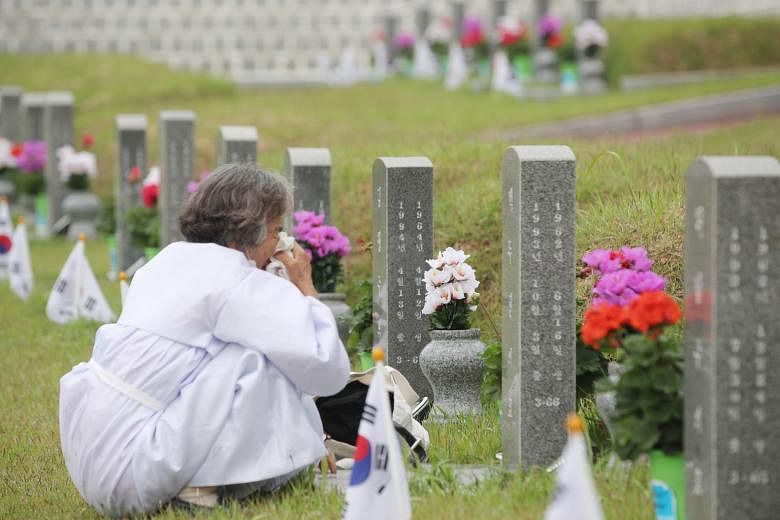GWANGJU (South Korea) • It has been 40 years since Ms Choi Jung-ja last saw her husband, who has been missing since South Korea's military dictatorship killed hundreds of people when they crushed the pro-democracy Gwangju Uprising, a scar that burns in the country's political psyche to this day.
On May 18, 1980, demonstrators protesting against dictator Chun Doo-hwan's declaration of martial law confronted his troops, and 10 days of violence ensued.
But conservatives in the country still condemn the uprising as a communist-inspired rebellion backed by North Korea, while left-leaning President Moon Jae-in wants to enshrine it in the Constitution.
Ms Choi's husband was 43 when he left their house in the southern city of Gwangju to buy oil for a heater at the family pub, never to return. Once the violence was over, Ms Choi searched frantically for him, even opening random coffins in the streets that were covered with blood-stained Korean flags.
"I couldn't continue after opening the third coffin," she said recently. "The faces were covered with blood - there were no words to describe them. The faces were unrecognisable."
There is no agreed toll for the Gwangju incident, with reports of secret burials both on land and at sea. The military, which remained in power for another eight years, had ample opportunity to dispose of the evidence.
Official bodies point to around 160 dead - including some soldiers and police - and more than 70 missing. Activists say up to three times as many may have been killed.
Gwangju is one of the most politicised historical events in a viciously polarised country.
The South is still technically at war with the nuclear-armed North. At the time of the uprising, Chun's military regime described it as a rebellion led by supporters of then opposition leader Kim Dae-jung, who comes from the Gwangju area, and pro-Pyongyang agitators.
Kim was arrested, convicted of sedition and sentenced to death. But the penalty was commuted under international pressure and he was granted asylum in the United States, before being elected president himself in the 1990s, after the restoration of democracy and winning the 2000 Nobel Peace Prize.
Chun was convicted in 1996 of treason over Gwangju and bribery, and condemned to hang, but his execution was commuted on appeal and he was released following a presidential pardon.
He still denies any direct involvement in the suppression of the uprising.
Today, South Korea's President Moon - who took part in other anti-dictatorship protests as a student - regularly highlights Gwangju, vowing to reopen investigations and calling for its inclusion in the Constitution. The opposition seeks to paint Mr Moon as a Pyongyang sympathiser.
Professor Hannes Mosler of the University of Duisburg-Essen said the right sought to use Gwangju to discredit liberals by linking them to the "absolute evil" of the North.
"North Korea lies at the heart of polarisation strategies in South Korea," Prof Mosler said.
"Once a fake narrative is built around the Gwangju Uprising that connects it with North Korea, this provides the fuel for the polarisation fire to burn further and further," he added.
Mr Moon's Democratic Party won a landslide election victory last month largely on the back of his government's successful handling of the coronavirus epidemic. But while the city of Daegu was at the centre of the outbreak, it is the right's last stronghold and Mr Moon's party lost every one of the seats it contested there.
Last year, the remains of some 40 people were discovered at the site of a former prison in Gwangju, where 242 relatives of missing people have given DNA samples in the hope of identifying corpses that have yet to come to light.
Among them is Ms Cha Cho-gang, 81, whose son never returned after setting out to sell garlic at a market in the city, aged 19.
"My husband died three years ago," she said. "His last wish was to bury our son's remains before his own funeral. I have the same wish, but I don't know if it will ever come true."
AGENCE FRANCE-PRESSE

